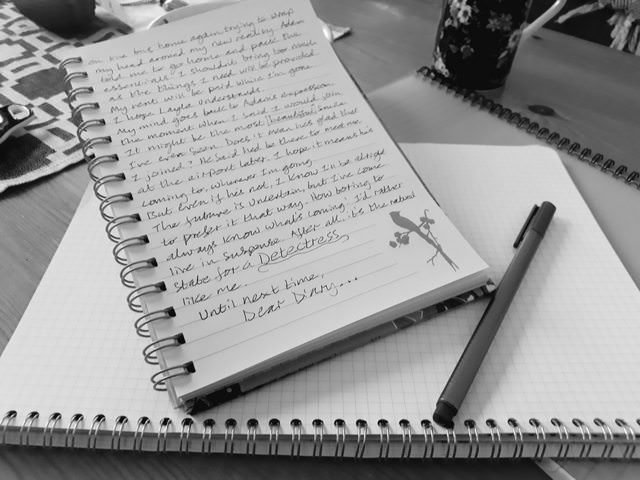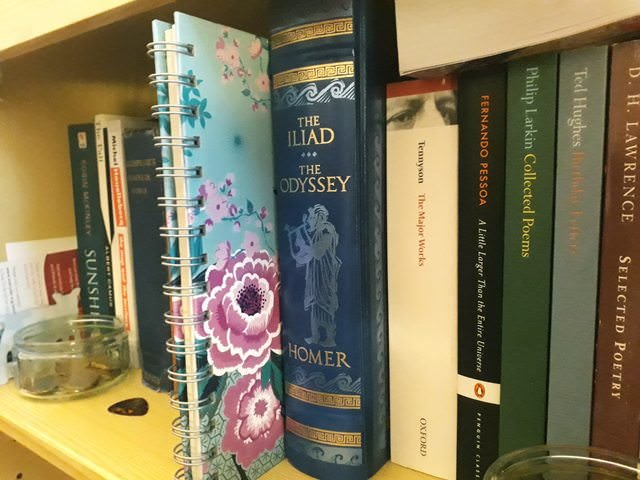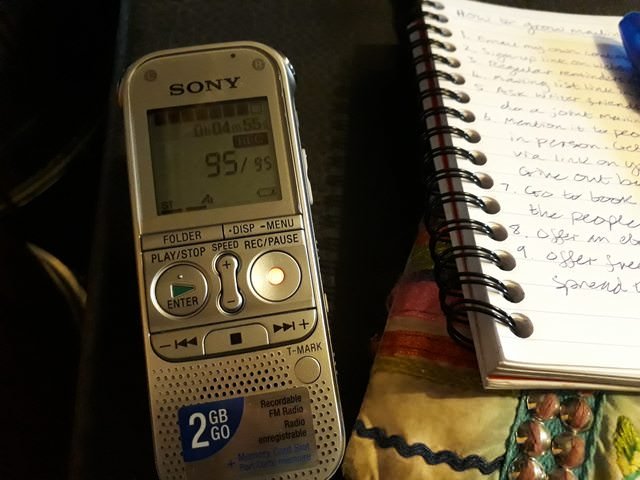Increased productivity,
assuaged anxiety,
sound decision-making,
working through relationship issues,
better planning...
assuaged anxiety,
sound decision-making,
working through relationship issues,
better planning...

Actually, I do it on my laptop these days, but who doesn't love an evocative picture
Having just reached the end of my Diary of a Detectress series, I feel it’s a good moment to share my own “Diary” habit. Journaling has been invaluable to me in my development as a writer, but even if you’re not focused on improving your writing or creativity, there are huge benefits to be gained from investing time in daily journaling.
What is daily journaling?
I guess a lot of people approach the thought of writing a journal with an inward groan. We all remember being assigned to write a “daily diary” for a set period at school. Even I (who was home schooled) remember being given this task, and I didn’t enjoy it very much.
The problem? I think it revolves around the fact that you’re writing for someone else’s eyes. And therefore you try to make it logical and coherent, and censor anything that might potentially be embarrassing or get you into trouble.
The type of journaling that I’ve learned to do is the complete opposite. It’s not really a record of what I’ve done or how I feel. Although sometimes I record those things. Most of the time, it’s an untidy splurge of everything I’m thinking, anything that’s on my mind, whatever comes into my head.
I basically try to type without stopping until my target number of words (750) is reached. These days it takes me about 12 minutes to get there, but when I started off I was much slower.
What’s the point?
Well I started doing it for the sake of creativity. If anyone has ever read The Artist’s Way, there’s a description of a writer’s exercise called Morning Pages. The idea is that you should take the first few minutes of each day – as soon as you wake up – to write a few pages of anything that occurs to you.
The point of doing it first thing is that you’re still sleepy, and therefore still half in the dream state. This is supposed to be where our imagination stems from. Allowing that part of your mind to express itself through writing keeps it closer to the surface for the rest of the day, so that you’re better able to access your creativity when you need it.
If any of you have ever had the experience of staring at a blank page or screen and wondering what to write, then I’m sure you’ll understand why this exercise seemed like a really worthwhile thing to try. Limitless creativity on demand? Sign me up!
Morning? HAH!
There was just one problem. I am totally NOT a morning person, and I found that doing Morning Pages in the morning was simply impossible. I was at university when I started doing it, and didn’t want to lose that extra half an hour of sleep before classes, even for the sake of becoming a better writer.
However, I tried the exercise later in the day, and found that it was still beneficial in unlocking my creativity. Even now when I have flexible schedule, I still prefer to write my journal later in the day, and I still think I get a ton of benefit from doing it.
But what do you write about?
You might be thinking, “but what if I’ve got nothing to write about?” I had a similar question when I began doing it. The trick is to force yourself to write something. Anything. Even: “I don’t know what to write” (I never got to the point of writing that particular sentence, but I wrote similar things in the early days).
The beauty of this exercise is that your writing doesn’t have to be GOOD. No-one is going to see it. It doesn’t even have to make sense. You can write random words if that’s what comes into your mind. As long as you keep writing until you’ve finished a few pages.
And the more you do it, the easier it gets. The more I forced myself to write about nothing, the more I found that I actually had things I wanted to say.
Nowadays, I can’t wait to do my journaling because I have so many words welling up, ready to pour out and spill onto the page. I sometimes even do it twice a day.
And wonder of wonders, that fluency and flow has spilled over to the times when I'm working on something that people are actually going to read. Although I have to go a bit slower, I’m still able to start writing immediately and tap into my creativity on demand. Practice really does help - even when it comes to finding inspiration.

What journaling has done for me
Improving my creativity isn’t the only benefit I’ve experienced. Here are some others:
Faster typing
I wasn't expecting this, but it stands to reason that if you practice typing quickly for 15 mins every single day, then you’ll get better at it. I used to be super slow at typing. Now I’m about 50 wpm.
Working through problems
If there’s something bothering me, or a decision I have to make, then I use my journaling time to write about it. I don’t try to be logical or coherent about it, I simply type my thoughts on the subject as they come. Writing them down this way usually gives me a different perspective. I can get to the bottom of how I truly feel (as opposed to what my logical brain is telling me) about the various options, which can often be a pivotal step in making the final decision. I always come away feeling like I've made a breakthrough.
Better planning
I tend to write my journal before digging into my other tasks for the day, and in doing so, I get space to think about how best to apportion my time AND to get in the creative zone.
The amazing boost of a positive daily habit
I didn’t anticipate the positive effect it would have on me until I managed to establish this habit and stick to it. Writing these pages wasn’t a big time commitment. Even when I started and was slow at it, it didn’t take me longer than twenty minutes to get to 750 words. But the effect on my morale was huge! Even on the shittiest days, I felt like I had ACHIEVED something, because I completed my words!
Feeling like a writer
And that brings me on to the final benefit. They say that a writer is a person who writes. After getting into this habit, I had absolute proof that I was a writer. Because I had written something every single day. It wasn’t anything I could show to people. It wasn’t good. Much of it didn’t even make sense. But that didn’t matter. I’d made a positive step towards achieving my dream, and that was a huge deal for me.
Where do I write?
I have to give thanks to an amazing online platform that has been fundamental to my success in establishing this daily habit. 750words.com provides you with a blank page and a wordcount, and a notification that pops up to tell you when you’ve reached the target. Best of all, there’s a progress log to track each day you succeed in writing the target number of words, as well as badges that you earn when you write for a certain number of days in a row without breaking your streak.
Yes, badges! It sounds dumb, but you have no idea how hard I worked and how amazing it felt when I finally earned that Space Bird badge (500 days in a row). If you’re interested in trying out the journaling idea, I highly recommend checking out this website.

Audio or video journaling
Not a writer? You can still get all the benefits of journaling in audio or video form. Check out this great post on webcam journaling by @axios where he explains how talking to a camera or recorder can have a similar effect in clearing your mind and unlocking your creativity.
In conclusion
After spending all this time locked away writing a journal just for myself (in fact not even for myself, as I almost never go back to read old entries), finding Steemit and beginning to post here feels like the natural next step. After all, a blog is almost like a public journal. The challenge is to make it interesting!
Thanks to everyone who’s been following and commenting on my posts so far. It’s really super encouraging to get the engagement and to have people to share the journey with.
Ok, you are the first person I've ever known to mention The Artist's Way! That book was life-changing for me!!
I ended up calling my writings 'Meditative Journaling' because when I did focus on just the writing, just the words that appeared in my mind, I was almost outside of myself looking in.
I read this book about 15 years ago as I was struggling with depression and it was a turning point for me. So glad to see it's helped you too! Great article!
I have to admit that I first found that exercise in a different book called Becoming a Writer by Dorothea Brande. However, my mum had a copy of The Artist's Way - along with the hundreds of other cool books that were lying around the house when I was growing up - so of course I dipped into it and I've heard it mentioned in various circles since then. Seems that it's played a similar role for a lot of people. So glad to hear it was such a help for you. Depression is a horrible beast when it rears its ugly head.